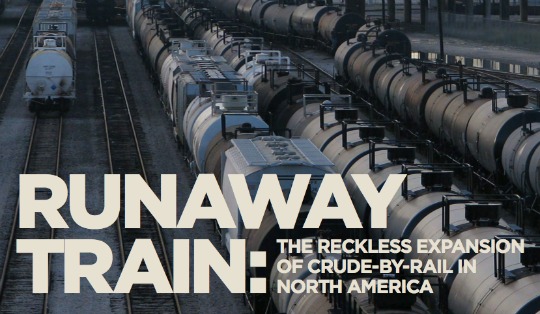Published on Friday, May 30, 2014 by Common Dreams
A newly published report this week raises the alarm over the nation’s expansion of crude-by-rail transportation as it makes a broader and direct warning about the threat of the Obama administration’s “all of the above” energy strategy that seeks to expand fossil fuel production in the U.S. despite the climate emergency on the nation’s doorstep.
The report by Oil Change International, titled Runaway Train: The Reckless Expansion of Crude By Rail in North America, is the first major exposé of the dangers inherent in the expansion of crude-by-rail industry on the continent.
“This is what the ‘All of the Above Energy Strategy’ looks like – a runaway train headed straight for North American communities.” Lorne Stockman, report author
Following violent and deadly disasters like the derailment and explosion in the town of Lac Megantic, Quebec last year and the continued fight to stop major oil pipelines, the report goes out of its way to argue that the debate between rail transport vs. pipelines is a false one. It shows that spills and disasters both methods of transport are on the rise, a fact which proves that the fossil fuel paradigm should be relegated to the history books, replaced with a new energy system that invests in conservation and efficiency as well as renewable resources such as wind, geothermal, and solar.
Complete with an online interactive map, the study details where crude trains are being loaded and unloaded, how many oil trains are crossing North American, and names of the companies involved.
“Our analysis shows just how out of control the oil industry is in North America today. Regulators are unable to keep up with the industry’s expansion-at-any-cost mentality, and public safety is playing second fiddle to industry profits,” said Lorne Stockman, Research Director of Oil Change International and author of the report. “This is what the ‘All of the Above Energy Strategy’ looks like – a runaway train headed straight for North American communities.”
Among the report’s key findings:
- Today there are 188 terminals in Canada and the United States actively loading and unloading crude oil onto and off of trains. A t least 33 of these terminals are expanding their capacity to handle more crude. An additional 51 new terminals are under construction or planned.
- Over 800,000 barrels per day (bpd) of crude oil were shipped o n U.S. railroads in 2013, a 70-fold increase from 2005. Including Canada, total North American crude-by-rail shipments are currently around one million bpd.
- If all the operating, expanding, under construction, and planned terminals were utilized to full capacity, it would entail some 675 t rains with 100 cars each, carrying a total of around 45 million barrels of oil through North American communities every day.
- BNSF, owned by Warren Buffet, carries up to 70 percent of all t he crude-by-rail traffic in North America today. This railroad a lone expects to load one million barrels per day onto its network by the end of 2014.
- Many of the U.S. crude-by-rail terminal operators operate as M aster Limited Partnerships (MLPs). These companies avoid corporate level income taxes entirely and distribute cash to shareholders on a tax-deferred basis. This translates into a massive subsidy for crude-by-rail operations.
The report comes ahead of a nation-wide week of action planned for early July in which national and local groups opposed to the industry—including Oil Change International, ForestEthics, 350.org, the Sierra Club, and residents of Lac-Mégantic—will rise to challenge these dangerous trains and their cargo as they pass through communities and fragile ecosystems.
“Communities are already waking up to the dangers of oil trains barreling through their backyards, with spills, explosions and derailments happening all too often. This report and online tool will help provide the critical information that’s been sorely missing in order to shine a light on what’s really going on, and to help stop the runaway train of crude-by-rail in its tracks before more damage is done,” Stockman said.
_______________________________________



